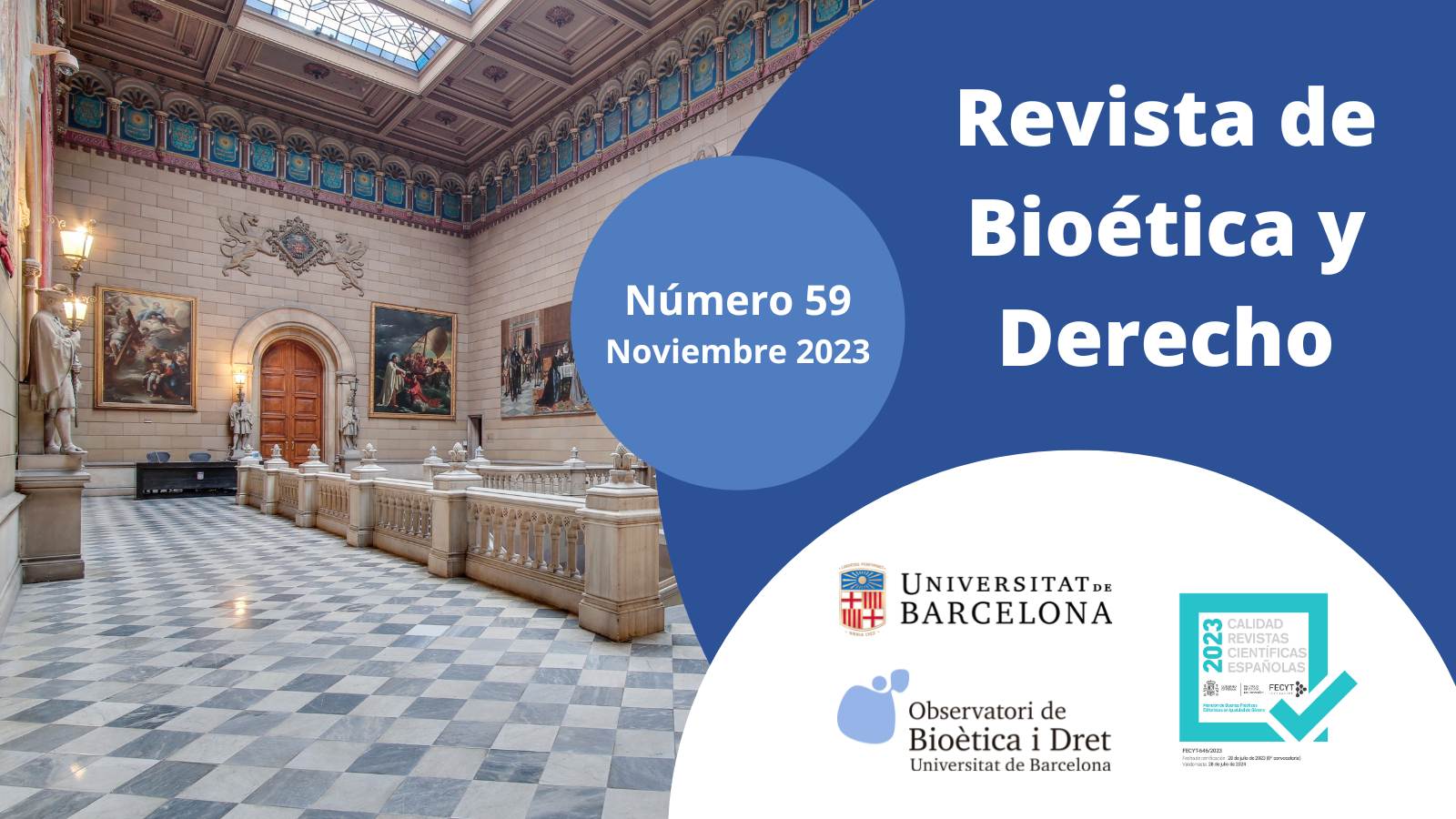Bioethical considerations for research on medical residents
DOI:
https://doi.org/10.1344/rbd2023.59.43320Keywords:
vulnerability, medical residents, research on vulnerable groups, intersectionality, medical residenciesAbstract
This paper argues that research on medical residency programs is necessary to improve the work and academic environment that physicians experience in their training as specialists. Therefore, some considerations are proposed to ensure ethical research. on medical residents. For this purpose, the paper follows the structure of two premises and a conclusion, where each premise is analytically supported. The first premise is that the structural factors of medical residency programs lead to a condition of vulnerability. The first premise is supported by exploring the structural factors that contribute to their vulnerability from the analysis of the Mexican context and the theoretical framework of intersectionality. Thus, some of the characteristics that intersect and determine the way in which residents experience their social spaces and development environments are presented. The second premise is that researching a vulnerable group leads to the development of strategies for change. The article recognizes the need to research and develop interventions for vulnerable social groups to improve their situation and provide a safer environment.
References
Beauchamp, T., & Childress, J. (1983). Principles of Biomedical Ethics. New York: Oxford University Press.
Butler, J. (2016). Rethinking vulnerability and resistance. Vulnerability in resistance, 12-27.
CIFRHS. (2023). ENARM. Información por año. Consultado el 18 de abril de 2023. Disponible en: http://www.cifrhs.salud.gob.mx/index.html
Crenshaw, K. W. (2017). On intersectionality: Essential writings. The New Press.
Fineman, M. A. (2010). The vulnerable subject and the responsive state. EmoRy lJ, 60, 251.
Gil-Monte PR. (2005) Factorial validity of the Maslach Burnout Inventory (MBI-HSS) among Spanish professionals. Rev Saude Publica.2005;39:1---8.23.
Goldberg D, Bridges K, Duncan-Jones P, Grayson D. (1988) Detecting anxiety and depression in general medical settings. British Medical Journal; 297 :897 doi: 10.1136/bmj.297.6653.897
JASS. (2023). Interseccionalidad. Disponible en: https://justassociates.org/es/ideas-clave/la-interseccionalidad/.
Levine, C., Faden, R., Grady, C., Hammerschmidt, D., Eckenwiler, L., & Sugarman, J. (2004). The Limitations of “Vulnerability” as a Protection for Human Research Participants. The American Journal of Bioethics, 4(3), 44–49. doi:10.1080/15265160490497083.
Low, Z. X., Yeo, K. A., Sharma, V. K., Leung, G. K., McIntyre, R. S., Guerrero, A., Lu, B., Sin Fai Lam, C. C., Tran, B. X., Nguyen, L. H., Ho, C. S., Tam, W. W., & Ho, R. C. (2019). Prevalence of Burnout in Medical and Surgical Residents: A Meta-Analysis. International journal of environmental research and public health, 16(9), 1479. https://doi.org/10.3390/ijerph16091479.
Lucas-Guerrero, V., Pascua-Solé, M., Ramos Rodríguez, J. L., Trinidad Borrás, A., González de Pedro, C., Jover Navalón, J. M., Rebasa, P., Targarona Soler, E. M., Serra-Aracil, X., en nombre de la Comisión Nacional de la Especialidad de Cirugía General y del Aparato Digestivo, & de la Sección de Formación de la Asociación Española de Cirujanos (2020). Burnout in General Surgery Residents. Survey From the Spanish Association of Surgeons. Desgaste profesional o Burnout en los residentes de Cirugía General. Encuesta de la Asociación Española de Cirujanos. Cirugia espanola, 98(8), 442–449. https://doi.org/10.1016/j.ciresp.2020.04.013.
Luna, F. (2004). Vulnerabilidad: la metáfora de las capas. Journal of Bioethics, 4(3), 44-49.
Maina, G., Mauri, M., & Rossi, A. (2016). Anxiety and depression. Journal of Psychopathology, 22(4), 236-250.
Maslach, C., Jackson, S. E., & Leiter, M. P. (1997). Maslach burnout inventory. Scarecrow Education.
Mata, D. A., Ramos, M. A., Bansal, N., Khan, R., Guille, C., Di Angelantonio, E., & Sen, S. (2015). Prevalence of Depression and Depressive Symptoms Among Resident Physicians: A Systematic Review and Meta-analysis. JAMA, 314(22), 2373–2383. https://doi.org/10.1001/jama.2015.15845.
Montiel-Jarquín, Á. J., Torres-Castillo, M. E., Herrera-Velasco, M. G., Ahumada-Sánchez, Ó. O., Barragán-Hervella, R. G., García-Villaseñor, A., & Loría-Castellanos, J. (2015). Estado actual de depresión y ansiedad en residentes de Traumatología y Ortopedia en una unidad de tercer nivel de atención médica. Educación médica, 16(2), 116-125.
Norma Oficial Mexicana NOM-001-SSA3-2012, Educación en salud. Para la organización y funcionamiento de residencias médicas. (2023) Diario Oficial de la Federación, publicado el 04 de enero del 2013. Recuperado de https://dof.gob.mx/nota_detalle.php?codigo=5284147&fecha=04/01/2013#gsc.tab=0.
Nussbaum, M. C., & Mosquera, A. S. (2012). Crear capacidades. Madrid, España: Paidós.
OPS/OMS | Organización Panamericana de la Salud. (2022) Determinantes Sociales de la Salud [Internet]. Recuperado el 24 de noviembre del 2022, disponible en: https://www.paho.org/es/temas/determinantes-sociales-salud#:~:text=La%20Organizaci%C3%B3n%20Mundial%20de%20la,condiciones%20de%20la%20vida%20cotidiana%22.
Rodríguez Weber, FL, & Ramírez Arias, JL. (2016). ¿Tenemos claro lo que es la residencia médica? Acta médica Grupo Ángeles, 14(3), 183-184. Epub 24 de septiembre de 2021. Recuperado el 18 de enero de 2023, de http://www.scielo.org.mx/scielo.php?script=sci_arttext&pid=S1870-72032016000300183&lng=es&tlng=es.
Ruof, M. C. (2004). Vulnerability, Vulnerable Populations, and Policy. Kennedy Institute of Ethics Journal, 14(4), 411–425. doi:10.1353/ken.2004.0044.
Sen, A. (1999). Development as Freedom. Knopf. New York.
Suárez Manrique, W. (2017). De la subordinación a la cooperación laboral: una alternativa desde el igualitarismo constitucional. [Internet]. Universidad de Cartagena. Recuperado el 18 de enero del 2023.
Downloads
Published
How to Cite
Issue
Section
License
Copyright (c) 2023 Sofía Teresa Díaz Torres

This work is licensed under a Creative Commons Attribution-NonCommercial-NoDerivatives 4.0 International License.
 The author retains the copyright and grants Revista de Bioética y Derecho the right of first publication of the article. All articles published in Revista de Bioética y Derecho are under Creative Commons licensing Recognition – Non Commercial – NoDerivedArtwork (by-nc-nd 4.0), which allows sharing the content with third parties, provided that they acknowledge its authorship, initial publication in this journal and the terms of the license. No commercial use of the original work or generation of derivative works is permitted.
The author retains the copyright and grants Revista de Bioética y Derecho the right of first publication of the article. All articles published in Revista de Bioética y Derecho are under Creative Commons licensing Recognition – Non Commercial – NoDerivedArtwork (by-nc-nd 4.0), which allows sharing the content with third parties, provided that they acknowledge its authorship, initial publication in this journal and the terms of the license. No commercial use of the original work or generation of derivative works is permitted.







